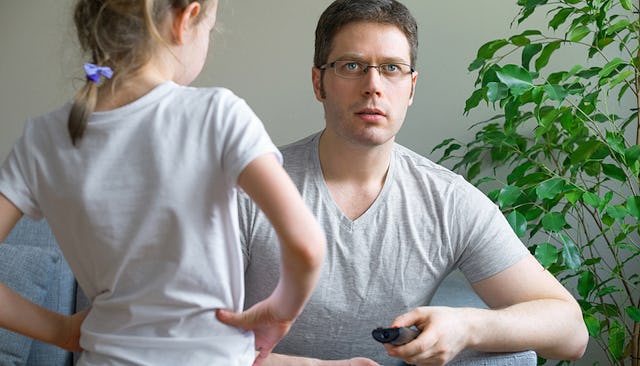The Most Dangerous Words A Parent Can Say

It is an unquestionable truth that what we say to our children – even the shortest string of words put together — can make a powerful, lasting impact. Words can build up or tear down, they can be a blessing or a curse, and they are capable of creating chaos (kind of like the kids themselves). But there’s one phrase that can be particularly dangerous — yet parents utter it on a regular basis. I know that I say it probably 20 times every single day, and I bet you do, too, without even realizing it.
Those harmless-yet-dangerous little words?
“Mm-hmm.” Or their equally risky variation, “Uh-huh.”
If you want to get technical, they’re not even words, but sounds — sounds that indicate that 1) we are listening, 2) we are interested, and 3) we are in some sort of agreement. The irony is that most of the time when we say these things, we are actually none of the above.
But the reason we keep saying them is because most of the time, they achieve the desired result, which is making our kids stop pestering us, without overtly saying, “Go away! I’m trying to do something.” Saying that would make us feel like terrible parents, and make the children feel totally unimportant, so we opt for the mm-hmm middle ground, as demonstrated in the following scenario.
Me: *trying desperately to balance budget and do calculations and concentrate and stuff*
Son: Hey Mom, do you know Matthew from the bus — not the Matthew that picks his nose and throws his boogers at people, but the Matthew that wears glasses and has a little sister named Abby and that dog who humps everything? Well, he got a new pack of Pokémon cards for his birthday last week and guess what it had in it? It had a Raichu Break card and he’s really proud of it. But I would rather have a Rayquaza C Lv. X because that’s like super rare. And Mom, can I get a pack of Pokémon cards if I do some chores around here? Or maybe like a Pokémon T-shirt because Aaron — not the Aaron from down the street, but the Aaron in Mrs. Gunnerson’s class who has red hair and spits all the time — he wears this really awesome T-shirt, and I think his mom got it at Target and it might have been on sale, so can we please check next time we’re there?
Me: Mm-hmm.
Son: Thanks, Mom! You’re the best!” *scampers off
In situations like this, it works like a charm. We are absolved of the interruption and free to resume whatever important task we were trying to complete, and our kids feel like they’ve been heard. In truth, I may have only picked up a few snippets here and there — humping dog, Pokémon cards, Mrs. Gunnerson, T-shirts — but it’s sufficient.
Sure, it’s important to listen to our kids — to stop what we’re doing, look them in their eyes, and truly listen. And if they always approached us at an opportune time, like when we’re clipping our fingernails or folding laundry or doing one of the other thousand menial and mindless tasks we do on the daily — or perhaps when we literally ask them direct questions such as, “How was your day?” — it would be easier. But children have a knack for wanting to talk while we’re on the phone with the insurance company, or trying to meet a work deadline, or generally just trying to think. So we pull in our pinch-hitter, our go-to response, true listening’s attractive-but-shallow cousin: mm-hmm.
However, though “mm-hmm” can be an effective solution, it’s also a gamble. It’s like playing roulette. It works often enough for us to trust it implicitly, but it also has the potential to backfire, which is what makes it dangerous — because instead of a ramble about Pokémon cards and spitting kids, it could go something like this:
“Hey, Mom, do you remember when Grandma had that cat named Patches and it was such a cool cat and we had so many good times with it? That was a really awesome cat and my friend Jamie — not the Jamie who can’t pronounce ‘pancakes’ but the Jamie who always wears orange socks — he found this cat that kind of looks like Patches running around his yard, and it’s really skinny and some of its hair is falling out and it has, like, this really crusty eye and his mom said he can’t bring it in the house. But we really want to help it and he has some straw outside from when his dog had fleas to make it a bed, so can we bring it here?”
In this case, “mm-hmm” may bring you your moment of desired peace. But it will also bring you a diseased cat and a bunch of flea-ridden straw (and a moral dilemma of what to do with said cat) and a parenting dilemma of what to do with a disappointed child. Bad news all around.
So beware, fellow parents. Use the power of “mm-hmm” sparingly. The very phrase that masquerades as a sanity-saver sometimes just complicates the ever-loving shit out of things.